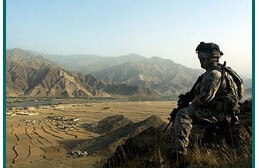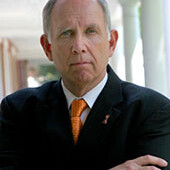It is possible that we may look back to August 2009 as a "turning point" in the war in Afghanistan. The problem is, at this juncture, it is unclear which way it is turning. August witnessed a dramatic increase in American casualties and also the conduct of the second national elections in Afghanistan.
Over 45 American soldiers and Marines were killed during the month of August, making it the bloodiest month in the history of this conflict. The total number of dead for foreign forces (U.S. and NATO) may have already exceeded 300 for 2009, which makes it the bloodiest year to date. American dead for the year have exceeded 175 so far. Recent casualties are in part due to the increase in American forces in Afghanistan and expanded operations.
A recent report stated that coalition forces were responsible for 19 civilian deaths from July through August 27, compared to 151 civilian deaths in about the same period last year. In the current period, civilian deaths at the hands of insurgents totaled 249. This report apparently does not include the deaths of at least 41 Afghan civilians following a massive car bombing last week in Kandahar, southern Afghanistan's most important city. This bombing, coming in the immediate aftermath of attacks preceding and during the Afghan elections, may suggest a greater effort by the Taliban to target the civilian population.
It also seems clear that the Taliban and al-Qaeda have altered their tactics. The Joint Improvised Explosive Device Defeat Organization reported 828 attacks in Afghanistan using improvised explosive devices during July 2009. This is the highest level of the war and twice the level for July 2008. There are additional reports that the Taliban and al-Qaeda are expanding their use of the radio airways, cell phones, and the Internet to spread propaganda. As a result, the Obama administration is reported to be establishing a new State Department unit that will initially have a budget of $150 million to counter this effort.
Afghan national elections were conducted on August 20 and did occur without the massive level of violence that many had feared. President Karzai claimed that there were 73 attacks in the 15 provinces of Afghanistan on election day, but 94 percent of the polling stations remained open. Some observers suggest that the level of violence may have been substantially higher. The Taliban had stated a goal of disrupting this event, and Kandahar was struck by at least nine rockets. They had further threatened to cut the fingers off anyone who voted, and at least two people were found hanged with purple-stained fingers.
Still the Taliban failed in their goal of preventing the elections from occurring. Many observers took solace in the fact that the country could even conduct an election under these circumstances. The voter turnout, however, will be far below the 70 percent that was reported in 2004. Some election monitors suggest it might not exceed 35 percent. This is due to a combination of intimidation by the Taliban and disillusionment that many people have with the political process. Many believe that the Karzai government has failed to deliver on its promises and is beset by widespread corruption.
Preliminary results show President Karzai ahead of his primary opponent (former Foreign Minister Abdullah Abdullah). Final results will not be available until early- to mid-September. If Karzai is unable to garner 50 percent of the vote, a run-off election of the two leading candidates will be conducted. This would not occur until mid-October, and this is due in part to the ongoing celebration of Ramadan.
Unfortunately, there have been widespread accusations of fraud and vote stealing. The majority of these are directed against President Karzai and his supporters by Abdullah. He argues that Karzai's reelection will be fraudulent and consequently illegitimate. The animosity between the two primary candidates and their supporters is further underscored by the ethnic divide of the country. Karsai is a Pashtun from the south, and Abdullah is a Tajik from the north.
American military leaders have been uniformly gloomy about the security situation in the country. General McChrystal commented in an early-August interview that the Taliban has the initiative in many parts of the country and warned that casualties will continue at current levels for the months ahead. Admiral Mullen also stated his concerns that the war was not going well, and his fear that American support was eroding. It was remarkable, as he noted, that this is the first time "we've ever really resourced a strategy on the civilian and military side."
General McChrystal is scheduled to deliver a much anticipated initial 60-day assessment in the first few days of September. Many believe he will definitely call for a dramatic increase in Afghan security forces. This will translate into additional U.S. spending for equipment and additional advisers (U.S. or NATO) to train these forces. It will be very interesting to see if he also requests additional American ground troops, as it is very unlikely that our European allies will increase their force deployments at all.
The Obama Administration is confronted by the prospects of a widening commitment to Afghanistan. General McChrystal and Admiral Mullen are publicly saying a minimum of 18 months is required to see any progress. Still military progress is inextricably linked to political progress and the current stalemate in Kabul following the elections. No additional troops or resources can compensate for a lack of some political consensus among the Afghan population. As a result, whether the national elections increase or decrease the legitimacy of whatever government results will be critical.



